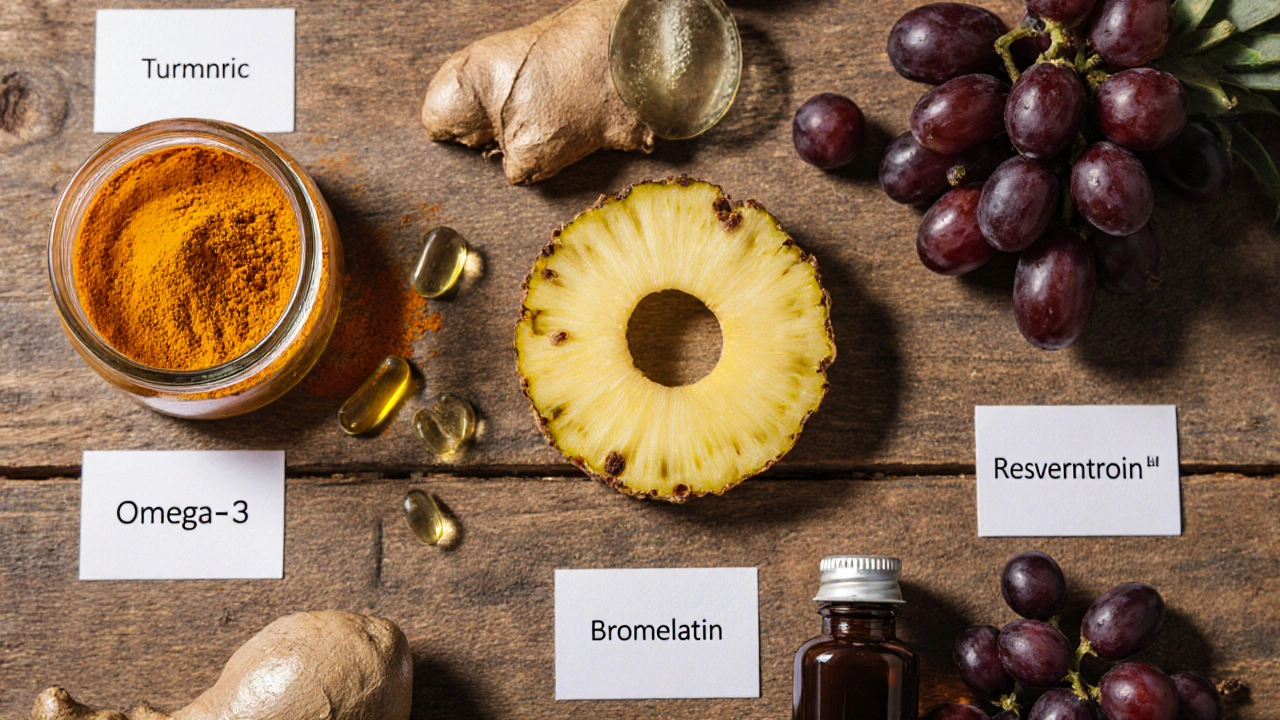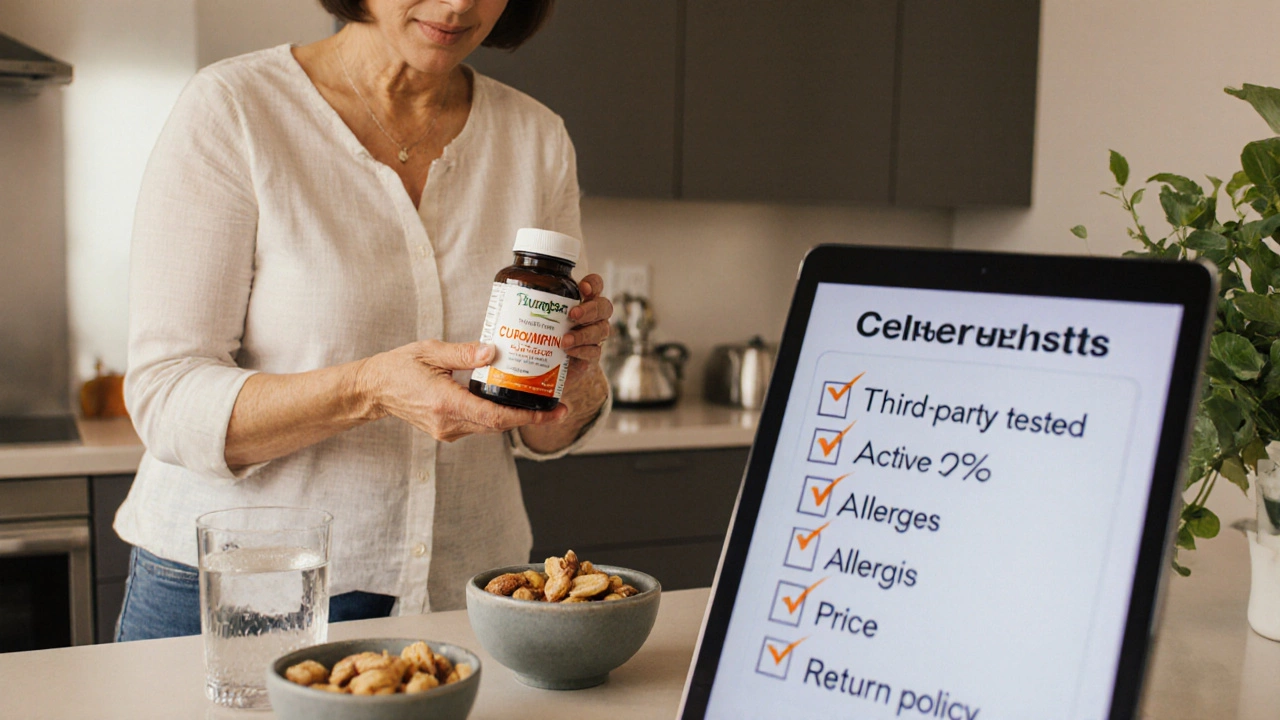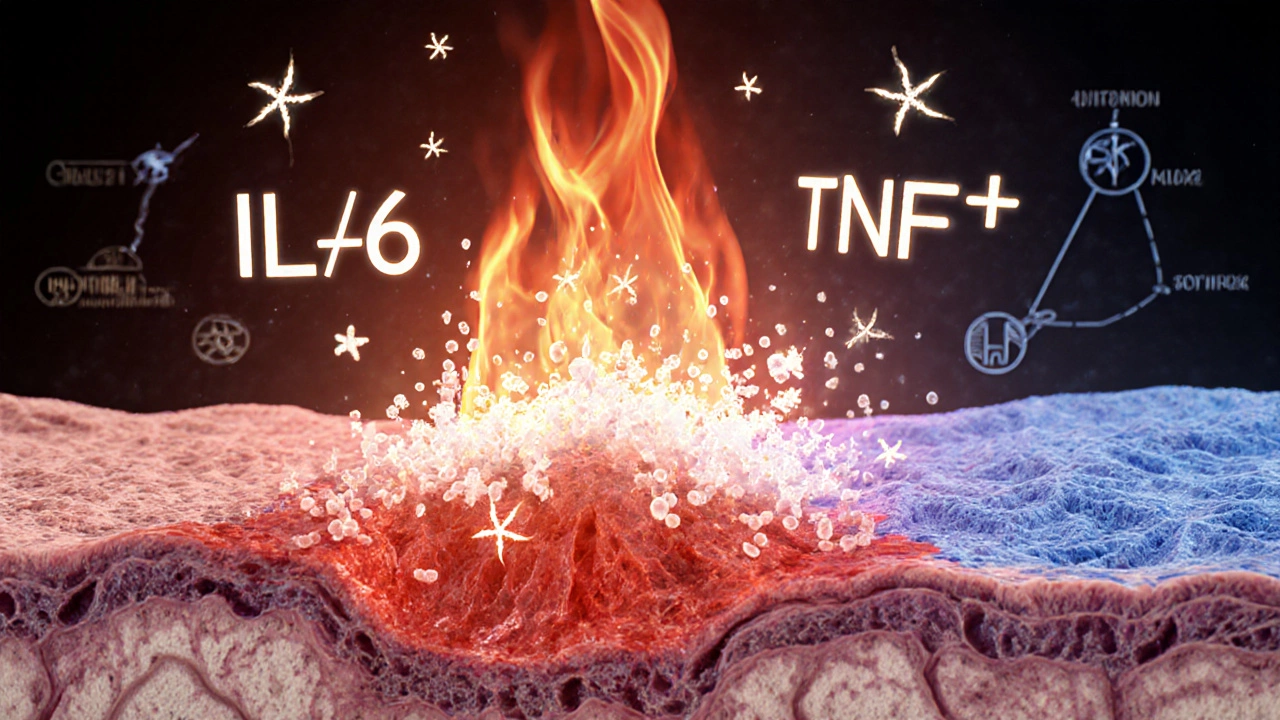Anti-Inflammatory Supplement Selector
Recommended Supplement(s)
Key Takeaways
- Inflammation is a natural alarm system, but chronic inflammation fuels many health problems.
- Turmeric (curcumin), omega‑3 fish oil, ginger, boswellia, bromelain, resveratrol, and quercetin have the strongest research backing.
- Effective doses vary: curcumin 500‑2000mg with black‑pepper extract, fish oil 1‑3g EPA/DHA, ginger 1‑2g, boswellia 300‑600mg, bromelain 200‑400mg, resveratrol 150‑500mg, quercetin 500‑1000mg.
- Watch for interactions with blood thinners, diabetes meds, and NSAIDs.
- Start with one supplement, monitor symptoms, and adjust based on personal tolerance.
When you search for the best supplement for inflammation, you’re looking for a safe, research‑backed option that can calm the fire without a prescription. Below we break down what inflammation really is, how supplements work, and which ingredients consistently rank at the top of the science pile.
What Is Inflammation?
Inflammation is the body’s built‑in response to injury or infection. White blood cells flood the site, releasing cytokines that trigger redness, heat, swelling, and pain. Acute inflammation heals wounds, but when the response sticks around for months or years, it becomes chronic and starts damaging tissues. Conditions such as arthritis, heart disease, diabetes, and even depression have strong links to chronic low‑grade inflammation.

How Supplements Tame Inflammation
Many natural compounds act as “signal modulators.” They don’t block inflammation the way NSAIDs do; instead, they balance the signaling pathways, lowering overactive cytokines (like IL‑6, TNF‑α) and boosting anti‑inflammatory mediators (like IL‑10). This gentler approach supports the body’s own regulation mechanisms and tends to carry fewer side‑effects.
Top Evidence‑Backed Anti‑Inflammatory Supplements
Below are the seven supplements that repeatedly show up in systematic reviews and randomized trials.
Turmeric (Curcumin) is a bright yellow spice derived from the rhizome of Curcuma longa. Its active compound, curcumin, blocks NF‑κB, a master switch for inflammatory genes. In a 2021 meta‑analysis of 12 trials, curcumin reduced joint pain scores by an average of 30% compared with placebo.
- Typical dose: 500‑2000mg of standardized extract (95% curcuminoids) daily, combined with 5‑10mg piperine to boost absorption.
- Best for: osteoarthritis, metabolic syndrome, general aches.
Omega‑3 Fish Oil contains the long‑chain fatty acids EPA and DHA, which are precursors to resolvins and protectins - molecules that actively resolve inflammation. A 2023 Cochrane review found EPA/DHA supplementation lowered CRP (C‑reactive protein) by 0.6mg/L on average.
- Typical dose: 1‑3g combined EPA/DHA per day.
- Best for: cardiovascular health, rheumatoid arthritis, skin inflammation.
Ginger (Zingiber officinale) provides gingerols and shogaols, which inhibit COX‑2 and lipoxygenase pathways. A 2022 double‑blind study showed 1g ginger extract reduced muscle soreness after eccentric exercise by 25%.
- Typical dose: 1‑2g powdered ginger or 100‑250mg standardized extract daily.
- Best for: digestive upset, post‑exercise inflammation, nausea‑related inflammation.
Boswellia Serrata (Indian frankincense) supplies boswellic acids that directly inhibit 5‑lipoxygenase, a key enzyme in leukotriene production. Clinical trials on ankylosing spondylitis report a 40% improvement in pain scores after 8 weeks of 300mg three times daily.
- Typical dose: 300‑600mg of a boswellic‑acid‑standardized extract per day.
- Best for: spinal arthritis, inflammatory bowel disease, asthma.
Bromelain is a proteolytic enzyme from pineapple stems. It reduces inflammatory mediators and improves tissue healing. A 2020 trial in sinusitis patients showed bromelain (500mg three times daily) cut swelling and mucus production by half.
- Typical dose: 200‑400mg of standard bromelain before meals.
- Best for: post‑surgical swelling, sports injuries, sinus inflammation.
Resveratrol is a polyphenol found in grapes and berries. It activates SIRT1, a gene that dampens NF‑κB signaling. In a 2021 pilot study, 150mg daily lowered inflammatory markers in obese adults by 12% over 12 weeks.
- Typical dose: 150‑500mg of high‑purity trans‑resveratrol daily.
- Best for: metabolic inflammation, anti‑aging protocols.
Quercetin is a flavonoid that stabilizes mast cells and blocks histamine release. A 2022 meta‑analysis linked 500mg daily to a modest drop in CRP and improved airway function in asthma patients.
- Typical dose: 500‑1000mg split into two doses with meals.
- Best for: allergic inflammation, vascular health, exercise recovery.
Quick Comparison of Top Anti‑Inflammatory Supplements
| Supplement | Main Active Compound | Effective Dose (typical) | Evidence Level | Best For |
|---|---|---|---|---|
| Turmeric (Curcumin) | Curcuminoids | 500‑2000mg + piperine | High (multiple RCTs) | Joint pain, metabolic inflammation |
| Omega‑3 Fish Oil | EPA/DHA | 1‑3g EPA/DHA | High (Cochrane reviews) | Cardiovascular, rheumatoid arthritis |
| Ginger | Gingerols, Shogaols | 1‑2g powder or 100‑250mg extract | Moderate (several RCTs) | Digestive, muscle soreness |
| Boswellia | Boswellic acids | 300‑600mg | Moderate‑High (clinical trials) | Spinal arthritis, IBD |
| Bromelain | Proteolytic enzymes | 200‑400mg | Low‑Moderate (pilot studies) | Post‑surgical swelling, sinus |
| Resveratrol | Trans‑resveratrol | 150‑500mg | Low‑Moderate (small RCTs) | Metabolic, anti‑aging |
| Quercetin | Quercetin flavonoid | 500‑1000mg | Moderate (meta‑analysis) | Allergic, vascular |

Choosing the Right Supplement for Your Needs
Start with a single ingredient that matches your primary concern. If you’re dealing with joint pain, turmeric or boswellia are logical first steps. For heart‑health‑related inflammation, fish oil wins the evidence race. Keep these practical tips in mind:
- Check the label for standardization. Look for percentages (e.g., 95% curcuminoids) or EPA/DHA content.
- Combine with absorption boosters when needed-piperine for curcumin, a fat source for omega‑3.
- Watch for blood‑thinner interactions: turmeric, ginger, boswellia, and omega‑3 can amplify anticoagulant effects.
- Start low, monitor any gastrointestinal upset, and gradually raise to the target dose.
- If you’re pregnant, nursing, or on prescription meds, talk to a healthcare professional before adding any supplement.
Quick Checklist Before You Buy
- Is the product third‑party tested for purity?
- Does it list the exact amount of the active compound?
- Are there any allergens (shellfish for fish oil, pineapple for bromelain) that affect you?
- Is the price reasonable for the stated potency?
- Does the brand have a clear return policy?
Frequently Asked Questions
Can I take more than one anti‑inflammatory supplement together?
Yes, but be strategic. Pair a fat‑soluble supplement (like curcumin with piperine) with a water‑soluble one (like bromelain) to avoid competition for absorption. Always stay within the recommended daily doses and watch for overlapping blood‑thinner effects.
How long does it take to see results?
Most studies report noticeable changes after 4‑8 weeks of consistent dosing. Some people feel relief within a few days, especially with ginger or bromelain, but longer‑term biomarkers (CRP, ESR) need at least two months to shift.
Are natural supplements safer than prescription anti‑inflammatories?
Natural compounds usually have milder side‑effects, but "natural" doesn’t equal "risk‑free." High doses of fish oil can increase bleeding risk; excessive turmeric may upset the stomach. Always respect dosage guidelines.
Should I take these supplements with food?
Most fat‑soluble agents (curcumin, omega‑3) absorb better with a meal that contains healthy fats. Enzyme‑based supplements like bromelain work best on an empty stomach, but you can split timing to avoid stomach upset.
Can these supplements replace NSAIDs for chronic pain?
They can reduce reliance on NSAIDs, but they seldom match the rapid pain relief of prescription drugs. Use them as part of a broader plan that includes diet, exercise, and, when needed, short‑term NSAID courses under doctor supervision.








